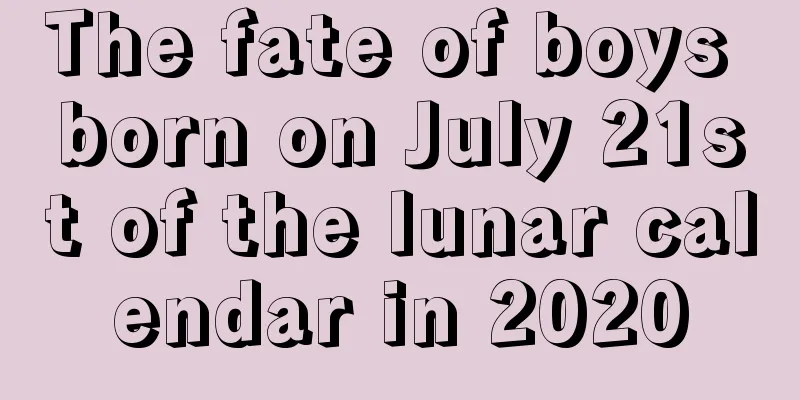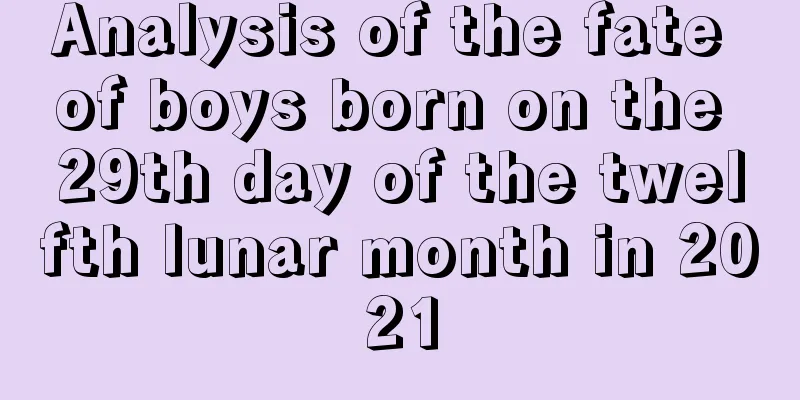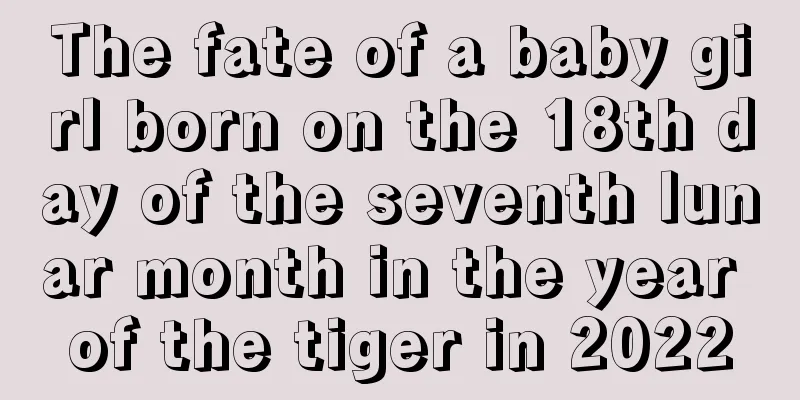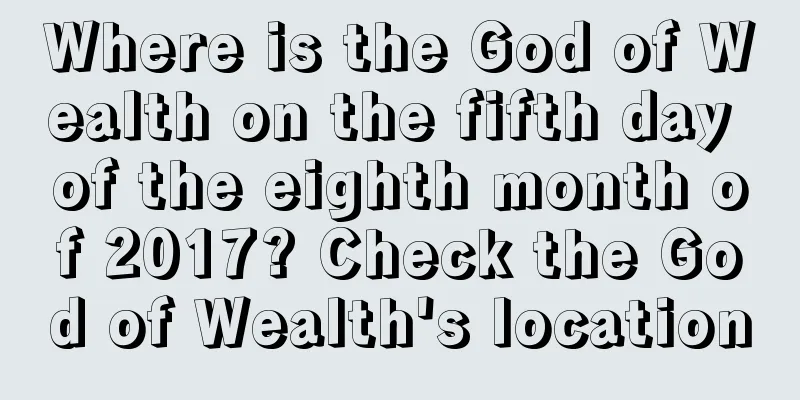What festival is on the last day of the twelfth lunar month? What is its origin?

What festival is on the last day of the twelfth lunar month? What is its origin? New Year's Eve refers to the last night of the twelfth lunar month of each year, which is connected to the Spring Festival (the first day of the first lunar month). Want to know more about the auspicious and inauspicious days in the twelfth month of the lunar calendar in 2018? Pay attention to Shuimoxiansheng.com’s special topic on the twelfth month of the lunar calendar!What festival is on the last day of the twelfth lunar month?The 30th day of the twelfth lunar month is the last day of the twelfth lunar month, also known as New Year's Eve. After this day it will be the first day of the first lunar month, the Spring Festival, so New Year’s Eve is very important to us. The New Year's Eve on the 30th day of the twelfth lunar month means getting rid of the old and welcoming the new, where getting rid of means getting rid of the old year and welcoming the new year. "Xi" means night, and New Year's Eve means welcoming the arrival of the new year on the night of the old year.Origin of New Year's Eve:New Year's Eve, which is the night of the New Year, is connected with the beginning of the year (New Year). The old year ends on this evening and the new year begins the next day, so it is commonly regarded as New Year's Eve. New Year's Eve, as a festival at the end of the year, originated from the ancient customs of getting rid of the old and welcoming the new, and worshiping ancestors at the end of the year. The earliest mention of the name "New Year's Eve" was in the local customs "Fengtu Ji" written by Zhou Chu of the Western Jin Dynasty. Later, the day before New Year's Eve was called Xiaochu, or Little New Year's Eve; New Year's Eve was called Dachu, or Big New Year's Eve. According to "Lüshi Chunqiu·Jidongji", the ancients used drum beating to drive away the "epidemic ghost" on the day before the New Year. At the end of each year, a "Dannu" ceremony was held. Beating drums to drive away the epidemic ghost was said to be one of the customs of the "New Year's Eve" at that time. New Year's Eve is usually called the last day of the lunar year, but in fact, due to the lunar calendar, the date of New Year's Eve may be December 30th or December 29th, but no matter what, it is the end of the lunar year.New Year's Eve customs:1. New Year's Eve Dinner <br /> Speaking of New Year's Eve, the first thing to mention is the New Year's Eve dinner. Many friends from other places try their best to go home for the New Year, just to have a sumptuous New Year's Eve dinner with their family on the night of the 30th. The New Year's Eve dinner is a reunion dinner. There are slight differences between the north and the south, but most of them will have dumplings (reunion), chicken (auspicious), fish (abundance every year), some places eat noodles (long-lasting), and some eat rice cakes (prosperity every year).During the New Year's Eve dinner, the whole family gathers together to chat about family matters and development, and children also use the festival to express their filial piety to their parents. Nowadays, many people work away from home most of the year, and only during the Spring Festival can they be with their elders and children, so we must cherish this opportunity, speak our minds, and talk about family matters. (Suggestion: spend less time on your phone and use less red envelopes) 2. Ancestor worship <br /> New Year's Eve, like Qingming Festival, Zhongyuan Festival and Chongyang Festival, is a traditional festival for ancestor worship in China. The forms of ancestor worship vary slightly from place to place. The simplest way is to burn paper at a crossroads. In most places, the younger generation takes gold ingots, candles, ghost money, etc. to the cemetery to invite the ancestors to come home for the New Year. In addition, on the 23rd day of the twelfth lunar month, the Kitchen God goes to the Jade Emperor in heaven to report on his work, and returns to the human world on New Year's Eve. Therefore, we have to welcome the Kitchen God on New Year's Eve, replace the new stove lamp in the kitchen, burn incense in front of the stove niche, and then the eldest person in the family presides over the ceremony of welcoming the god in front of the table of heaven and earth. 3. Paste Spring Festival couplets and the word "Fu" <br /> As for pasting Spring Festival couplets and the word "Fu", they are introduced in the previous two articles, so I will just briefly talk about it here. It is best to paste Spring Festival couplets between 6 am and 12 noon, and be careful not to paste the upper and lower couplets upside down. As for how to identify the upper and lower couplets, I will not explain them here. There are many rules for pasting the word "Fu". For example, the word "Fu" on the door should be pasted upright, and it should be an odd number, and it is best to just one. 4. Setting off firecrackers <br /> The traditional custom of setting off firecrackers on New Year's Eve comes from a historical legend. It is said that there is a monster called Nian, which will bring disaster to the people every year on the 30th. The monster is most afraid of three things: "red", "fire" and "explosion", so firecrackers are set off on New Year's Eve. Of course, beating drums is also acceptable. When it comes to setting off firecrackers, a special reminder is that you must set off them safely and be careful of fire or explosion injuries. It is best not to set them off. It costs money to buy firecrackers, setting them off is dangerous, and most importantly, it pollutes the environment. 5. Lucky money <br /> Usually after the New Year's Eve dinner, the elders give lucky money to the younger generations to encourage them to make progress and work hard, which also reflects the elders' love for the younger generations. Let me say a few more words here. Lucky money is actually a folk custom. What matters is its meaning, not its form or amount. However, in recent years, lucky money has changed. People are competing with each other for the amount, and it is easy to give 500 or 1,000 yuan. I think most migrant workers do not have very high salaries, and they earn their money through hard work. When they go home for the New Year, they spend tens of thousands of yuan as lucky money. Who would not feel bad? The New Year itself is a relaxing and enjoyable thing. Don't let these things make you upset. So giving 50 or 100 yuan as lucky money is enough. There is no need to compare. |
<<: Is there a 30th day in the twelfth lunar month? Is it the same day every year?
Recommend
Want to have a baby? You should know these Feng Shui
Introduction: Infertility is a disease that troub...
What gifts should I send to my parents’ home during the Mid-Autumn Festival in 2019? A complete list of Mid-Autumn Festival blessings for my family!
Introduction: Mid-Autumn Festival is one of the im...
Is it suitable to pick up the car on September 11th of the lunar calendar in 2020? Is it a good day to pick up the car?
Is it suitable to pick up the car on September 11...
In which direction is the God of Wealth on November 28th of the lunar calendar in 2020?
November is one of the three coldest months befor...
Do girls born on October 26th of the lunar calendar have good fortune? What is a good name for them?
Introduction: A child cannot choose his or her own...
Is the sixth day of the third lunar month in the Year of the Rat 2020 a good day to worship ancestors?
Is the sixth day of the third lunar month in the Y...
Is the Dragon Boat Festival in 2019 suitable for opening a new store? How many days are left until the Dragon Boat Festival in 2019?
Introduction: In the traditional culture of our co...
Where is the direction of the God of Happiness during the fourth snow solar term on November 4, 2021?
The eleventh month of the lunar calendar is the mo...
When and what time is Minor Cold in 2021? What can’t Xiaohan do?
Minor Cold is the 23rd solar term in the 24 solar ...
Which zodiac sign is born on the fifth day of the ninth lunar month in 2022, and what is the lucky item?
No matter which little happiness it is in the horo...
Is it a good idea for the company store to open on February 9, 2020?
The arrival of the apricot moon paints the earth ...
Is December 2, 2020 a suitable date to open a new store? Is it an auspicious day?
When the twelfth lunar month comes, the winterswe...
Is Arbor Day 2019 an auspicious day for opening a business? Is it a good day to open a business?
Arbor Day is on March 12th every year, so if you w...
Is it a good idea to open a new store or company on April 7, 2020 (4.29)?
Opening a business is a major Feng Shui event, an...
Why do we eat apples on Christmas Eve 2020? How do different countries celebrate festivals?
The day before Christmas is called Christmas Eve. ...









